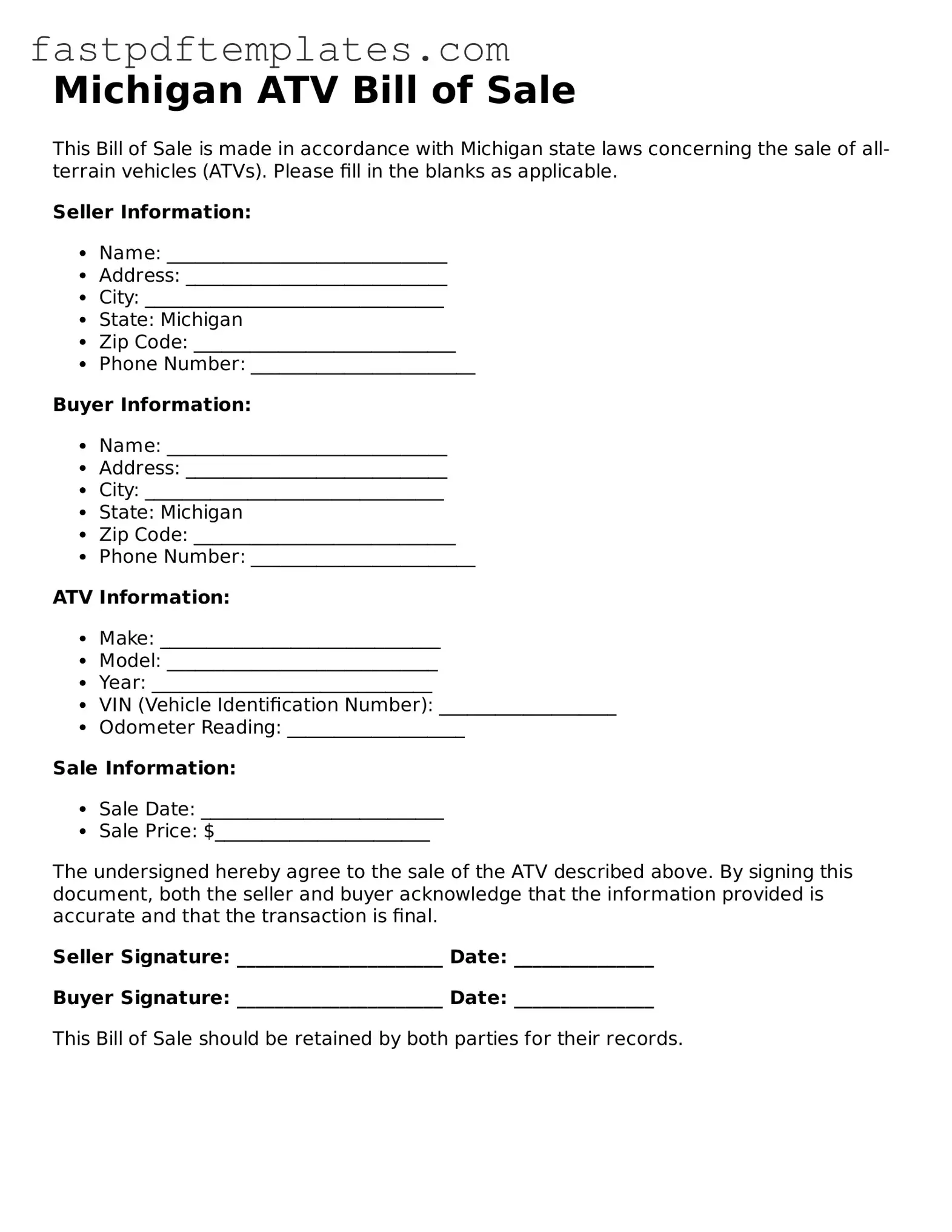The Michigan ATV Bill of Sale form shares similarities with the Vehicle Bill of Sale. Both documents serve as proof of ownership transfer for a vehicle, whether it be an all-terrain vehicle or a traditional car. They typically include details such as the buyer's and seller's information, the vehicle's identification number (VIN), and the sale price. This ensures that both parties have a clear understanding of the transaction and protects them in case of disputes.
Another document that resembles the Michigan ATV Bill of Sale is the Motorcycle Bill of Sale. Like the ATV Bill of Sale, this form is essential for transferring ownership of a motorcycle. It includes similar components, such as the motorcycle's make, model, year, and VIN, along with the buyer and seller's information. This documentation is crucial for registering the motorcycle in the new owner's name and ensuring a smooth transition of ownership.
The Boat Bill of Sale is also comparable to the ATV Bill of Sale. When selling or purchasing a boat, this document outlines the details of the transaction, including the boat's specifications and the sale price. Just as with ATVs, a Boat Bill of Sale protects both the buyer and seller by providing a record of the sale and confirming the transfer of ownership, which is essential for registration purposes.
The Snowmobile Bill of Sale serves a similar function for snowmobiles. This document includes the necessary details about the snowmobile being sold, such as its make, model, and VIN. It also captures the buyer's and seller's information, ensuring both parties are protected in the transaction. Just like the ATV Bill of Sale, it is vital for registration and legal ownership verification.
The Trailer Bill of Sale is another document that functions similarly. When a trailer is sold, this form outlines the specifics of the transaction, including the trailer's identification details and sale price. It provides a legal record of the sale, which is essential for the new owner when registering the trailer with the state, just as it is for ATVs.
The Personal Watercraft Bill of Sale is comparable as well. This document facilitates the transfer of ownership for personal watercraft, such as jet skis. It includes the watercraft's details, buyer and seller information, and the sale price. This ensures that the new owner can register the watercraft and enjoy their new purchase without complications.
The Farm Equipment Bill of Sale is another similar document. When agricultural machinery is sold, this form provides a detailed account of the transaction, including the equipment's specifications and sale price. Just like the ATV Bill of Sale, it serves as proof of ownership transfer and is important for the new owner in case of future registrations or inspections.
The Mobile Home Bill of Sale is also akin to the ATV Bill of Sale. This document is used when transferring ownership of a mobile home, detailing the home's specifications and the sale price. It ensures that the buyer has legal ownership and can register the mobile home appropriately, similar to the process for ATVs.
The Firearm Bill of Sale is another document that shares similarities. This form is used when transferring ownership of a firearm, capturing essential details about the weapon and the transaction. It protects both parties by providing a record of the sale, ensuring that the buyer can legally possess the firearm, much like the protections offered by the ATV Bill of Sale.
Lastly, the Pet Bill of Sale can be seen as similar in its purpose. This document is used when transferring ownership of a pet, detailing the animal's information and the sale price. While it may not involve registration like vehicles, it serves as a formal record of the transaction, ensuring that both the buyer and seller have clarity on the ownership change, similar to the intent behind the ATV Bill of Sale.

